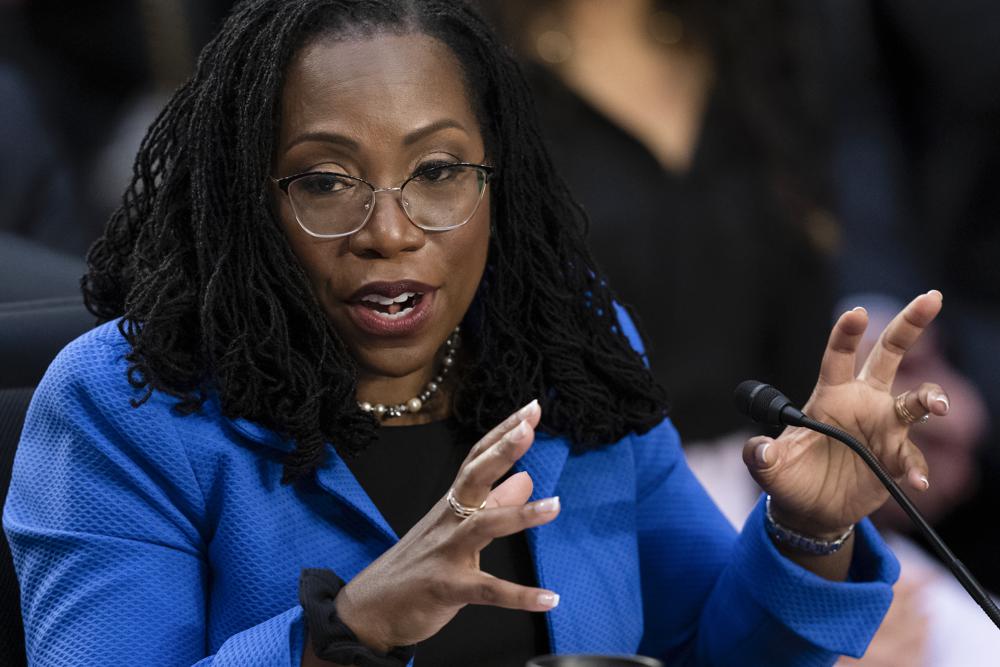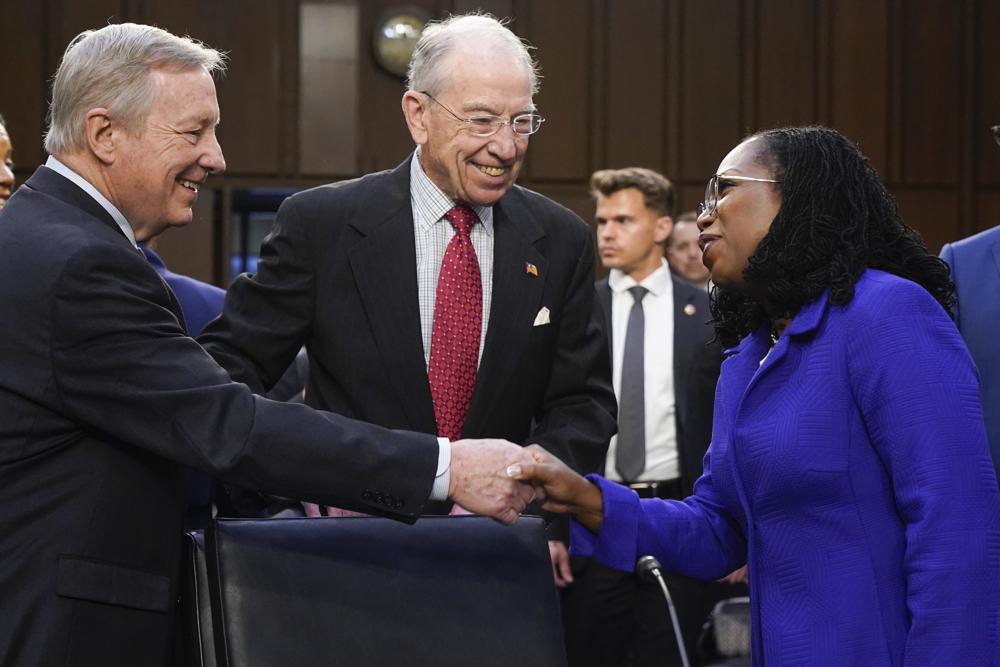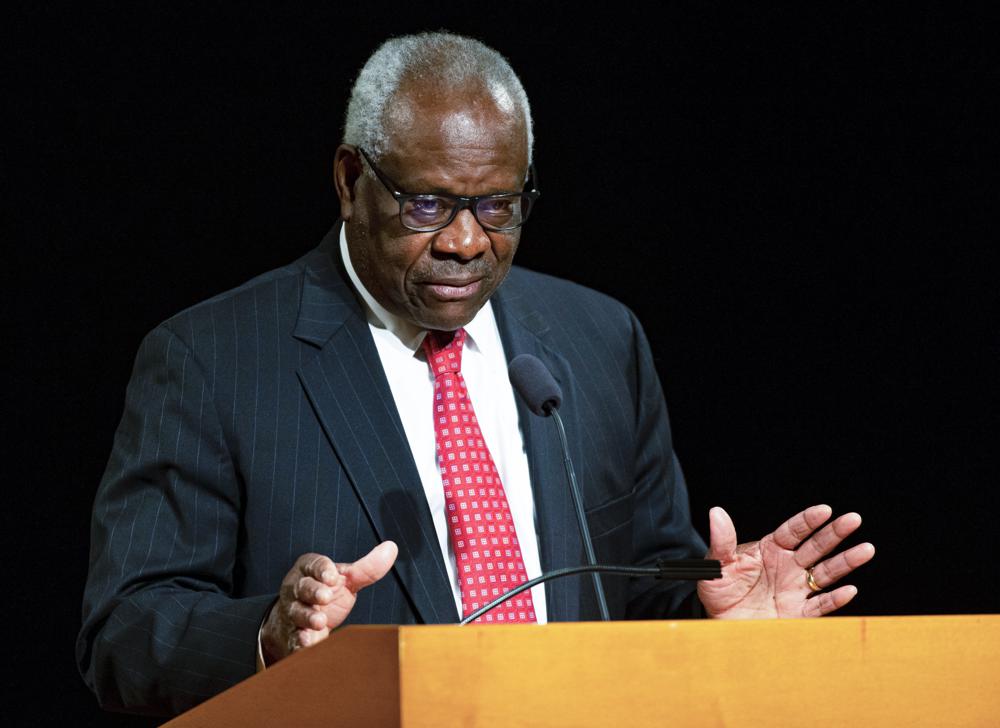Ketanji Brown Jackson seems headed for confirmation, says no ‘agendas’

Judge Ketanji Brown Jackson faced a barrage of Republican questioning Wednesday about her sentencing of criminal defendants, as her history-making bid to join the Supreme Court veered from lofty constitutional questions to attacks on her motivations as a judge. She declared she would rule “without any agendas” as the high court’s first Black female justice, rejecting Republican efforts to paint her as soft on crime in her decade on the federal bench. Democrats defended her and heralded the historic nature of her nomination. “America is ready for the Supreme Court glass ceiling to shatter,” Sen. Dick Durbin, the chairman of the Senate Judiciary Committee, said in Jackson’s second and last day answering questions at her confirmation hearings. Though her approval seems all but sure — Democrats are aiming for a vote before Easter — Republicans keep trying to chip away at her record. In more than 12 hours of testimony on Tuesday, and long into the day on Wednesday, GOP senators aggressively questioned her on the sentences she has handed down to child pornography offenders, her legal advocacy on behalf of terror suspects at Guantanamo Bay, her thoughts on critical race theory and even her religious views. In response to questioning about a case over affirmative action at Harvard University, her alma mater where she now serves on the Board of Overseers, Jackson said she would recuse herself. “That’s my plan,” she responded when Texas Sen. Ted Cruz asked her about it. The court will, in the fall, take up challenges to the consideration of race in college admissions in lawsuits filed by Asian American applicants to Harvard, a private institution, and the University of North Carolina, a state school. The court currently plans to hear the suits against the two schools together but could separate them and give Jackson a chance to take part in what will be one of next term’s biggest issues. Tempers rose at Wednesday’s hearing as the day wore on, with Durbin slamming down his gavel at one point when Cruz refused to yield after his time expired while he was grilling Jackson on the specifics of cases. “You can bang it as long as you want,” Cruz snapped, shouting that he just wanted Jackson to answer his question. “At some point, you have to follow the rules,” Durbin shot back. In another round of tense questioning, South Carolina Sen. Lindsey Graham interrogated Jackson on the punishment she believes appropriate for people convicted of child pornography. Like Cruz and others on the committee, Graham said she had been too lenient on those criminals. Graham frequently interrupted her as she tried to speak; at one point, he said judges should simply “put their a— in jail!” The focus on her sentencing was part of a larger effort by the committee’s Republicans — several of whom are potential presidential candidates — to characterize Jackson’s record and her judicial philosophy as too empathetic and soft on criminals who commit the worst offenses. It was also part of an emerging emphasis on crime in GOP midterm election campaigns. North Carolina Sen. Thom Tillis said she seemed like “a very kind person” — but “there’s at least a level of empathy that enters into your treatment of a defendant that some could view as maybe beyond what some of us would be comfortable with, with respect to administering justice.” The sustained focus on her record suggested that, contrary to Democratic hopes, Jackson’s confirmation vote in the full Senate is unlikely to garner much, if any, Republican support. Still, several Republicans acknowledged that she is likely to be on the court. Democrats can confirm her without any bipartisan support in the 50-50 Senate as Vice President Kamala Harris can cast the tie-breaking vote. Jackson, backed by committee Democrats, forcefully defended her record and said that the Republicans were mischaracterizing her decisions. Asked if her rulings were endangering children, she told the committee on Tuesday: “Nothing could be further from the truth.” She said she bases sentences on many factors, not just federal guidelines. Sentencing is not a “numbers game,” she said, noting that there are no mandatory sentences for sex offenders and that there has been significant debate on the subject. Some of the cases have given her nightmares, she said, and were “among the worst that I have seen.” Jackson said that if she is confirmed, she will do what she has done as a federal judge, “which is to rule from a position of neutrality, to look carefully at the facts and the circumstances of every case without any agendas, without any attempt to push the law in one direction or the other.” She reminded the committee that her brother and two uncles served as police officers and that “crime and the effect on the community, and the need for law enforcement — those are not abstract concepts or political slogans to me.” Defending her, Democratic Sen. Chris Coons of Delaware told Jackson that the Republican lines of questioning are “an attempt to distract from your broad support, your deep record, your outstanding intellectual and legal credentials.” President Joe Biden chose Jackson in February, fulfilling a campaign pledge to nominate a Black woman to the Supreme Court for the first time in American history. She would take the seat of Justice Stephen Breyer, who announced in January that he would retire this summer after 28 years on the court. Jackson would be the third Black justice, after Thurgood Marshall and Clarence Thomas, and the sixth woman. Her confirmation would maintain the current 6-3 conservative majority on the court. Democrats have been full of praise for Jackson, noting that she would not only be the first Black woman but also the first public defender on the court and the first with experience representing indigent criminal defendants since Marshall. Jackson said that having a diverse judicial branch is important because it “bolsters public confidence in our system” and “lends confidence that the rulings that the court is handing down are fair and just.” She spoke of her parents often
Ketanji Brown Jackson pledges to decide cases ‘without fear or favor’

Supreme Court nominee Ketanji Brown Jackson pledged Monday to decide cases “without fear or favor” if the Senate confirms her historic nomination as the first Black woman on the high court. Jackson, 51, thanked God and professed love for “our country and the Constitution” in a 12-minute statement to the Senate Judiciary Committee at the end of her first day of confirmation hearings, nearly four hours almost entirely consumed by remarks from the panel’s 22 members. Republicans promised pointed questions over the coming two days, with a special focus on her record on criminal matters. Democrats were full of praise for President Joe Biden’s Supreme Court nominee. With her family sitting behind her, her husband in socks bearing George Washington’s likeness, Jackson stressed that she has been independent, deciding cases “from a neutral posture” in her nine years as a judge, and that she is ever mindful of the importance of that role. “I have dedicated my career to ensuring that the words engraved on the front of the Supreme Court building — equal justice under law — are a reality and not just an ideal,” she declared. Barring a significant misstep, Democrats who control the Senate by the slimmest of margins intend to wrap up her confirmation before Easter. She would be the third Black justice, after Thurgood Marshall and Clarence Thomas, as well as the first Black woman on the high court. Jackson’s sternest Republican critics, as well as her Democratic defenders, all acknowledged the historic, barrier-breaking nature of her presence. There were frequent reminders that no Black woman had been nominated to the high court before her and repeated references to another unique aspect of her nomination: Jackson is the first former public defender nominated to be a justice. “It’s not easy being the first. Often, you have to be the best, in some ways the bravest,” Democratic Sen. Dick Durbin of Illinois, the committee chairman, said in support. Sen. Cory Booker, D-N.J., spoke of the “joy” in the room and acknowledged her family’s pride as Jackson’s parents beamed behind her. Booker repeated a story Jackson has frequently told about a letter her youngest daughter wrote to President Barack Obama several years ago touting her mother’s experience. “We are going to see a new generation of children talking about their mamas and daring to write the president of the United States that my mom should be on the Supreme Court,” Booker said. “I want to tell your daughter right now, that dream of hers is so close to being a reality.” In their opening statements, Democrats sought to preemptively rebut Republican criticism of her record on criminal matters as a judge and before that as a federal public defender and a member of the U.S. Sentencing Commission. Jackson “is not anti-law enforcement” and is not “soft on crime,” Sen. Patrick Leahy, D-Vt., said, noting that members of Jackson’s family have worked in law enforcement and that she has support from some national law enforcement organizations. ”Judge Jackson is no judicial activist.” The committee’s senior Republican, Sen. Chuck Grassley of Iowa, promised Republicans would “ask tough questions about Jackson’s judicial philosophy” without turning the hearings into a ”spectacle.” Sen. Lindsey Graham, R-S.C., noted that Democrats had opposed some past Republican judicial nominees who were Black or Hispanic, and he said that he and his GOP colleagues wouldn’t be deterred by Jackson’s race from asking probing questions. He said of some criticism from the left: “It’s about, ‘We’re all racist if we ask hard questions.’ That’s not going to fly with us.” Graham was one of three Republicans to support Jackson’s confirmation, 53-44, as an appellate judge last year. But he has indicated over the past several weeks that he is unlikely to vote for her again. While few Republicans are likely to vote for her, most GOP senators did not aggressively criticize Jackson, whose confirmation would not change the court’s 6-3 conservative majority. Several Republicans used their time to denounce Senate Democrats instead of Jackson’s record. The Republicans are trying to use her nomination to brand Democrats as soft on crime, an emerging theme in GOP midterm election campaigns. Biden has chosen several former public defenders for life-tenured judicial posts. In addition, Jackson served on the U.S. Sentencing Commission, an independent agency created by Congress to reduce disparity in federal prison sentences. With Jackson silently taking notes, Sen. Josh Hawley, R-Mo., said in his opening statement that his research showed that she had a pattern of issuing lower sentences in child pornography cases, repeating comments he wrote in a Twitter thread last week. The Republican National Committee echoed his claims, which Hawley did not raise when he questioned Jackson last year before voting against her appeals court confirmation. The White House, along with several Democrats at the hearing, has rejected Hawley’s criticism as “toxic and weakly presented misinformation.” Former Alabama Sen. Doug Jones, who is guiding Jackson as she navigates the Senate process, told reporters afterward that “she will be the one to counter many of those questions” from Hawley and others on Tuesday and Wednesday. Hawley is one of several committee Republicans, along with Ted Cruz of Texas and Tom Cotton of Arkansas, who are potential 2024 presidential candidates, and their aspirations may collide with other Republicans who would prefer not to pursue a scorched-earth approach to Jackson’s nomination. Her testimony will give most Americans, as well as the Senate, their most extensive look yet at the Harvard-trained lawyer with a broader resume than many nominees. She would be the first justice with significant criminal defense experience since Marshall. Jackson appeared before the same committee last year, after Biden chose her to fill an opening on the federal appeals court in Washington, just down the hill from the Supreme Court. The American Bar Association, which evaluates judicial nominees, has given her its highest rating, “well qualified.” Biden chose Jackson in February, fulfilling a campaign pledge to nominate a Black woman to the Supreme Court for the first time in American history. She would take the seat of Justice
Justice Clarence Thomas hospitalized with infection, high court says

Justice Clarence Thomas has been hospitalized because of an infection, the Supreme Court said Sunday. Thomas, 73, has been at Sibley Memorial Hospital in Washington, D.C., since Friday after experiencing “flu-like symptoms,” the court said in a statement. The court offered no explanation for why it waited two days to disclose that the justice was in the hospital. It also provided no additional details about the infection but said Thomas is being treated with antibiotics and his symptoms are abating. He could be released in the next couple of days, the court said. The Supreme Court is meeting this week to hear arguments in four cases. Thomas plans to participate in the cases even if he misses the arguments, the court said. Thomas has been on the court since 1991. News of his hospitalization came as the Senate Judiciary Committee prepared to begin hearings Monday in the nomination of Ketanji Brown Jackson, who President Joe Biden named to replace Stephen Breyer. He is retiring at the end of the session. Republished with the permission of the Associated Press.
Joe Biden banning Russia from U.S. airspace because of Ukraine

President Joe Biden will vow to make Vladimir Putin “pay a price” for Russia’s invasion of Ukraine in his first State of the Union address, rallying allies abroad while also outlining his plans at home to fight inflation and the fading but still dangerous coronavirus. In addition to recounting U.S. and allied economic sanctions against Russia, Biden planned to announce that the U.S. is following Canada and the European Union in banning Russian planes from its airspace in retaliation for the invasion of Ukraine, according to two people familiar with his remarks’ They spoke only on the condition of anonymity before the speech. Biden planned in his Tuesday night remarks to highlight the bravery of Ukrainian defenders and the resolve of a newly reinvigorated Western alliance that has worked to rearm the Ukrainian military and cripple Russia’s economy through sanctions. He was set to deliver an ominous warning that without consequences, Russian President Putin’s aggression wouldn’t be contained to Ukraine. “Throughout our history, we’ve learned this lesson – when dictators do not pay a price for their aggression, they cause more chaos,” Biden was to say, according to advance excerpts released by the White House. “They keep moving. And, the costs and threats to America and the world keep rising.” Even before the Russian invasion sent energy costs skyrocketing, prices for American families had been rising, and the COVID-19 pandemic continues to hurt families and the country’s economy. Biden planned to outline plans to address inflation by reinvesting in American manufacturing capacity, speeding supply chains, and reducing the burden of childcare and eldercare on workers. “We have a choice,” Biden was to say. “One way to fight inflation is to drive down wages and make Americans poorer. I have a better plan to fight inflation. Lower your costs, not your wages.” Set against disquiet at home and danger abroad, the White House had conceived Tuesday night’s speech as an opportunity to highlight the improving coronavirus outlook, rebrand Biden’s domestic policy priorities, and show a path to lower costs for families grappling with soaring inflation. But it has taken on new significance with last week’s Russian invasion of Ukraine and nuclear saber-rattling by Putin. In an interview with CNN and Reuters, Zelenskyy said he urged Biden to deliver a strong and “useful” message about Russia’s invasion. Ahead of the speech, the White House announced that Ukrainian Ambassador to the U.S. Oksana Markarova would join first lady Jill Biden in the galleries to watch Biden’s address. Biden will address a mask-optional crowd in the House chamber, one sign of the easing coronavirus threat. But he’ll also speak from within a newly fenced Capitol due to renewed security concerns after last year’s insurrection. Rising energy prices as a result of Russia’s war in Ukraine risk exacerbating inflation in the U.S., which is already at the highest level in 40 years, eating into people’s earnings and threatening the economic recovery from the pandemic. And while the geopolitical crisis in Eastern Europe may have helped to cool partisan tensions in Washington, it can’t erase the political and cultural discord that is casting doubt on Biden’s ability to deliver on his pledge to promote national unity. Biden is speaking to an American public that is frustrated with his performance. A February AP-NORC poll found that more people disapproved than approved of how Biden is handling his job, 55% to 44%. That’s down from a 60% favorable rating last July. White House officials acknowledge the mood of the country is “sour,” citing the lingering pandemic and inflation. Biden, in his speech, will highlight progress from a year ago — with the majority of the U.S. population now vaccinated and millions more people at work — but also acknowledge that the job is not yet done, a recognition of American discontent. Biden aides say they believe the national psyche is a “trailing indicator” that will improve with time. But time is running short for the president, who needs to salvage his first-term agenda to revive the political fortunes of his party before November’s midterm elections. House Republicans say the word “crisis” describes the state of the union under Biden and Democrats — from an energy policy that lets Russia sell oil abroad to challenges at home over jobs and immigration. “We’re going to push the president to do the right thing,” said House Majority Leader Kevin McCarthy. At least a half dozen lawmakers, including Reps. Jamie Raskin and Pete Aguilar, both members of the committee investigating last year’s Capitol riot, and Sen. Alex Padilla, D-Calif., had tested positive for COVID-19 and were not expected at the Capitol for the speech. Where his speech to Congress last year saw the rollout of a massive social spending package, Biden plans this year to repackage past proposals in search of achievable measures he hopes can win bipartisan support in a bitterly divided Congress before the elections. The president was to highlight investments in everything from internet broadband access to bridge construction from November’s $1.2 trillion bipartisan infrastructure law as an example of government reaching consensus and delivering change for the nation. He also planned to appeal to lawmakers to compromise on rival competitiveness bills that have passed the House and Senate; both meant to revitalize high-tech American manufacturing and supply chains in the face of growing geopolitical threats from China. The speech comes as progress on many of Biden’s other legislative priorities remains stalled on Capitol Hill after Democratic Sen. Joe Manchin scuttled the sweeping “Build Back Better” spending bill that Biden championed last fall. As part of his pitch to voters, Biden was to resurrect components of the legislation, but with a new emphasis on how proposals like extending the child tax credit and bringing down child care costs could bring relief to families as prices rise. He was also to outline how his climate change proposals would cut costs for lower- and middle-income families and create new jobs. Jen Psaki said Biden “will absolutely use the word inflation” in the speech but emphasized that he was


